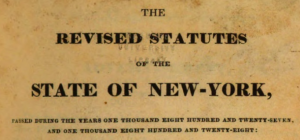Holding Over and Recent Revisions to New York Landlord-Tenant Law
 Prior blog posts have discussed the operational aspects of holdover landlord-tenant eviction proceedings. Holdover proceedings, unlike non-payment proceedings, occur when a tenant’s lease term has expired, or when a tenant has never had a lease, and either party exercises their legal prerogative to terminate the tenancy. This is in contrast to a non-payment proceeding, which is when a tenant with a valid lease fails to make his rent payments.
Prior blog posts have discussed the operational aspects of holdover landlord-tenant eviction proceedings. Holdover proceedings, unlike non-payment proceedings, occur when a tenant’s lease term has expired, or when a tenant has never had a lease, and either party exercises their legal prerogative to terminate the tenancy. This is in contrast to a non-payment proceeding, which is when a tenant with a valid lease fails to make his rent payments.
Recently, the New York State Legislature passed the Housing Stability & Tenant Protection Act of 2019, which became fully effective in October, 2019. This legislation comprises multiple amendments to the Real Property Actions and Procedure Law and the Real Property Law of New York State and has a significant effect on holdover proceedings. This blog post will explore the changes created by the new law.
The first important revision relates to the notice period prior to commencing a Court proceeding in a holdover action. Under the previous law, either party had the right to terminate a month-to-month tenancy upon thirty day’s notice. This notice period applied in two situations – if the tenant had an existing lease which expired by its term, or if the tenant never had a lease. Once the lease expires, or, after a month for which the tenant paid rent, the party seeking termination would serve a “Notice to Quit” upon the other party. This Notice would state that the month-to-month tenancy would terminate in thirty days. If the tenant had paid rent for the month, the termination notice would have to be dated at least thirty days after the month for which rent was paid. For example, the month-to-month tenant has paid rent for the month of October. This covers the period from October 1st through October 31st. The thirty-day termination notice would have to terminate the lease as of the end of the month after October, so it would state that the tenancy would terminate as of November 30th. In addition, once the notice was served, but prior to a Court action being commenced, the landlord would not be allowed to collect rent for the following month (in our example, November), as it would make the termination notice ineffective, and subject any Court action to being dismissed on that basis.
My Best Friend’s Girl
 News outlets have recently reported the death of an eighties icon, the “Cars” lead singer Rick Ocasek. When he passed away, he was in the process of divorcing his wife of several decades who was “…dancing ‘neath the starry sky…”. The Will filed for his estate stated that although his divorce may not be final at his death, his wife is to be denied her elective share because she abandoned him. This post will discuss the legal concepts involved in such an estate structure and whether Ocasek’s wishes are likely to be implemented.
News outlets have recently reported the death of an eighties icon, the “Cars” lead singer Rick Ocasek. When he passed away, he was in the process of divorcing his wife of several decades who was “…dancing ‘neath the starry sky…”. The Will filed for his estate stated that although his divorce may not be final at his death, his wife is to be denied her elective share because she abandoned him. This post will discuss the legal concepts involved in such an estate structure and whether Ocasek’s wishes are likely to be implemented.
We have previously evaluated marital rights in a New York estates. If a person dies without a Will, an estate administration would be conducted and the intestacy statute dictates the persons who will inherit. In the case when a spouse and children survive, the surviving spouse would receive Fifty Thousand Dollars and one-half of the balance of the estate. When there is a Will, a probate proceeding will be necessary. New York’s elective share statute provides in effect that a spouse cannot be disinherited. Even if the Will does not provide for the spouse to inherit, the surviving spouse can take her elective share, which is one-third of the value of the estate in most cases.
It is necessary to consult with skilled estate practitioners when experiencing significant life events such as divorce. As the “…good times…” may no longer “…roll…”, one’s documents should be reflective of current relationships. Perhaps Ocasek told his estranged wife that “…you can’t go on thinking nothing’s wrong, who’s going to drive you home tonight?” Further, it may be helpful in the case of a famous person who may not wish for his Will to be available for viewing by the general public to create a Trust.
Fraud, Foreclosure, and Property Transfers in New York
 A recent New York Times article discusses why black homeowners in Brooklyn are being victimized by fraud in the transfer of the ownership of their properties without their consent. Of course, deed theft is not limited to any particular part of New York, or any color. Homeowners of all races should beware of predatory individuals and companies who may seek to defraud them when they may be in financial distress. This blog post will discuss this issues a homeowner must be aware of in such situations.
A recent New York Times article discusses why black homeowners in Brooklyn are being victimized by fraud in the transfer of the ownership of their properties without their consent. Of course, deed theft is not limited to any particular part of New York, or any color. Homeowners of all races should beware of predatory individuals and companies who may seek to defraud them when they may be in financial distress. This blog post will discuss this issues a homeowner must be aware of in such situations.
The most common scenario is when a homeowner is facing foreclosure. A foreclosure may occur when a mortgage is unpaid, or when property taxes are not paid. In such cases, the homeowner is entitled to at least ninety day’s notice prior to a foreclosure action being filed with the Court and an action is commenced in the Supreme Court located in the county in which the property is located.
The commencement of a foreclosure lawsuit give the potential predator an opportunity to pounce. Because such lawsuits are public records, any individual or company can look up in the Courthouse or on e-courts and see the location of properties which are in foreclosure, and the name of the individual homeowner in each foreclosure case. After the information is harvested, the company may then contact the homeowner with a “rescue scheme,” in which they claim they will “save the property” from foreclosure. They may advance a small sum of money, with the promise of more advances, if the homeowner will execute certain documents. The documents, rather than being innocuous, may allow the schemer to transfer the property from the homeowner to the “rescue company.” After the property has been transferred, the company may then quickly “flip” it to an unwitting buyer, while the original homeowner has been deceived into signing away their property.
Settlement of Landlord-Tenant Actions in New York State
 Although the public image is that legal cases are resolved through a trial of the issues involved, the fact is that most cases are settled well before any trial occurs. This is especially true with regards to landlord-tenant cases. The Court structure and sheer number of cases which must be heard by a busy landlord-tenant court makes it impractical to have a trial for every eviction matter, or even a small fraction of eviction cases. What happens to the cases which do not go to trial? They are usually resolved through an agreement reached between the parties, usually negotiating through their attorneys. This blog post will explain how the process occurs.
Although the public image is that legal cases are resolved through a trial of the issues involved, the fact is that most cases are settled well before any trial occurs. This is especially true with regards to landlord-tenant cases. The Court structure and sheer number of cases which must be heard by a busy landlord-tenant court makes it impractical to have a trial for every eviction matter, or even a small fraction of eviction cases. What happens to the cases which do not go to trial? They are usually resolved through an agreement reached between the parties, usually negotiating through their attorneys. This blog post will explain how the process occurs.
Once an action has been commenced in landlord-tenant court, the Court assigns a return date, which, statutorily, must now be at least fourteen days after the Petition is served on the tenant. During this period of time, an experienced attorney will contact the attorney for the other party to discuss the possibility of resolving the case without further Court proceedings. The issues which need to be resolved may be the amount of time in which the tenant is required to vacate the premises, as well as whether the tenant will make payments (called “use and occupancy”) during this period of time. If the tenant wishes to remain at the premises, outstanding issues such as payment of past due rent, and amelioration of any outstanding property condition issues, may also need to be resolved. The effect of the newly enacted amendments to New York’s landlord-tenant laws should also be considered.
Assuming the attorneys can come to an understanding which satisfies both the landlord and the tenant, the next step is to prepare a Stipulation of Settlement. This document will specifically delineate each parties’ rights and responsibilities. For example, it may state that the tenant will vacate the property as of a specific date. More importantly, it will state that if the tenant fails to vacate on the agreed-upon date, then the landlord is legally entitled to a Warrant of Eviction, which is a document allowing a Marshal or Sheriff to physically evict the tenant. Usually, the landlord’s attorney will have to provide the Court with an Affirmation of Non-Compliance, which is a document stating that the tenant has not complied with the terms of the Stipulation of Settlement. The Stipulation may also call for the tenant to receive notice of such an application, so he has an opportunity to cure his default.
Do Real Estate Sales by Religious Institutions Benefit Congregants?

We wish to share a recent news article with our readers concerning whether selling real estate owned by religious institutions to developers benefits congregants and the neighborhood in general. Many properties owned by religious institutions have been owned by the organization for decades and, during that time, served the needs of congregants. However, perhaps over the years the particular population of a religious denomination in an area has dwindled and the institution is currently serving a greatly reduced number of congregants. In addition, long-held properties may be facing deferred maintenance issues such as a roof that needs replacement and the like.
Of course, real estate developers have always been hungry for a good deal and target congregations that may own such obsolete properties. Such developers seek to demolish the religious building and change the use entirely, perhaps to build luxury apartments to be sold for a handsome price. As a result, not only does the religious institution cease to exist, but the character of the neighborhood may change. Persons served by the soup kitchen in the church will have to find somewhere else to go while a wealthy developer will count his money.
The law in New York does provide some safeguards for congregants in this situation. As we have discussed in prior posts , a New York Religious Corporation seeking to sell, lease or buy property, or obtain a loan backed by a mortgage on property it owns, must obtain approval of the New York State Attorney General’s Office . The Attorney General reviews a petition presented by the institution in support of the contemplated transaction. Such petition needs to contain the governing documents of the religious institution, proof of the due calling and required vote of the trustees and congregants as needed by the governing documents and a complete description of the transaction in an affidavit. In sum, the Attorney General is also looking to confirm that the proposed deal benefits the congregants. For instance, if the transaction reduces mortgage debt and the new mortgage has more favorable terms, the Attorney General is likely to approve it. In the alternative, if the building is sought to be sold and a new building may be built in a distant location which prohibits attendance by current congregants, the Attorney General may determine that such a deal will not adequately serve the needs of current congregants and will be rejected.
Fairway Store Closure and its Implications for its Commercial Lease

We endeavor to inform our readers as to relevant news pertaining to our region. One of the Fairway grocery stores located in Rockland County closed yesterday. This store is part of a chain comprising approximately fifteen stores. As reported , the tenant was in year six of its commercial lease. Most commercial leases are likely to be for a term of at least ten years, with options to renew. As such, the tenant likely is vacating before the end of its lease term. Although this author has not personally reviewed the lease at issue, this post will discuss the provisions customarily contained in such commercial leases and the issues raised when the tenant leaves before the end of the lease.
Fairway represented that it decided to close this particular location not because of the overall financial health of its company. Other anchor tenants at the shopping center had already closed, which caused decreased customer volume for the grocery store that adversely affected its revenues.
Landlords typically negotiate the following provisions in leases. The rent due escalates through the end of the lease and the tenant forfeits its security deposit if the tenant vacates early. In order to avoid such costly penalties, the tenant may try to find a replacement tenant to whom the lease can be assigned. When the lease is originally negotiated, an experienced attorney will negotiate a liberal assignment clause so that the tenant can more readily exit the lease if the business is not successful at the location. That way, the landlord will be required to accept another tenant located by the tenant that is leaving the shopping center.
Significant Changes New York Landlord-Tenant Law
 Recent blog posts have discussed sweeping changes to New York State’s regulations for rental units. These changes were recently passed by the state legislature, and signed into law by Governor Cuomo. A prior post discussed the changes regarding rent regulated units. However, many rental units, especially in Westchester County, are not subject to rent regulation. They include premises with fewer than six rental units, as well as properties in towns or cities which have not adopted the “emergency” rent regulations, which the new law has made permanent.
Recent blog posts have discussed sweeping changes to New York State’s regulations for rental units. These changes were recently passed by the state legislature, and signed into law by Governor Cuomo. A prior post discussed the changes regarding rent regulated units. However, many rental units, especially in Westchester County, are not subject to rent regulation. They include premises with fewer than six rental units, as well as properties in towns or cities which have not adopted the “emergency” rent regulations, which the new law has made permanent.
However, changes to the way in which landlords may rent their units are not the only significant part of the new law. There are also provisions relating to eviction procedures in New York, which will have a major effect on both landlords and tenants. As our firm represents both landlords and tenants, we are carefully studying the new law so that we can advise our clients accordingly.
While a full discussion of the every aspect of the new landlord-tenant rules is beyond the scope of this post, here are some of the “highlights” or “lowlights”, depending on your perspective and role as a landlord or tenant. The first one relates to the notice period, which is the period after the tenant has been served with an eviction petition, but before he has to appear in Court. Under the old law, the “window period” was 5-12 days, meaning at least five days, but not more than twelve days. The new law has increased the period to 10-17 days, meaning that the hearing date must be at least ten days after the eviction petition is served, but no more than seventeen days.
Pumpkins, Changing Leaves and the Fall Real Estate Market in New York
 The prevalence of pumpkin flavored products and the approach of colorful leaves signals that we have entered the Fall real estate market in New York. This post will address the implications of the change of seasons and how that affects real estate transactions. For the purposes of this discussion, single family homes are being analyzed because apartments and townhouses sell more easily during all times of the year.
The prevalence of pumpkin flavored products and the approach of colorful leaves signals that we have entered the Fall real estate market in New York. This post will address the implications of the change of seasons and how that affects real estate transactions. For the purposes of this discussion, single family homes are being analyzed because apartments and townhouses sell more easily during all times of the year.
Negotiation strategies employed by your attorney may change once the Spring market has passed. In the area served by our attorneys , many single family homes are listed in the late Winter or early Spring, are in contract by June and close in August. This typical schedule follows the needs of those purchasers who wish to have their children start school in early September in their new home.
A seller’s situation will depend upon whether her home was listed since the Spring and did not sell or is a new listing as of the Fall. A new listing may receive more attention from buyers because inventory is typically lower in the Fall and older listings have already been evaluated by buyers. Sellers who have listed their home for several months may already need to consider price reductions and other concessions in order to sell the property. It should be noted that reducing the price will potentially allow the property to more readily appraise to the figure indicated in the contract.





